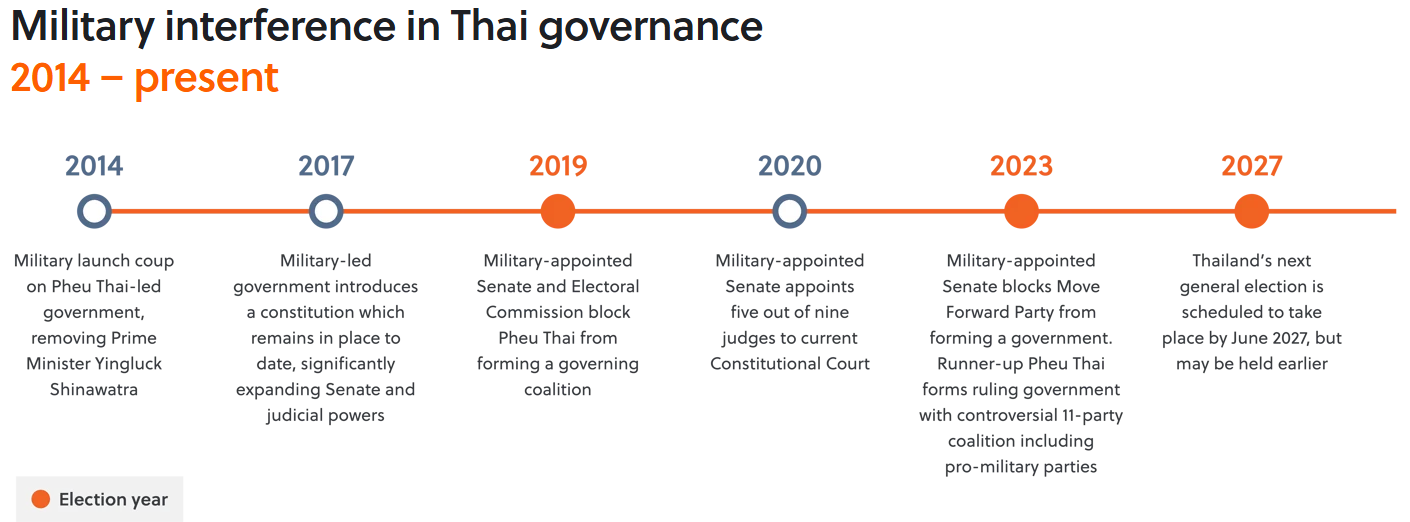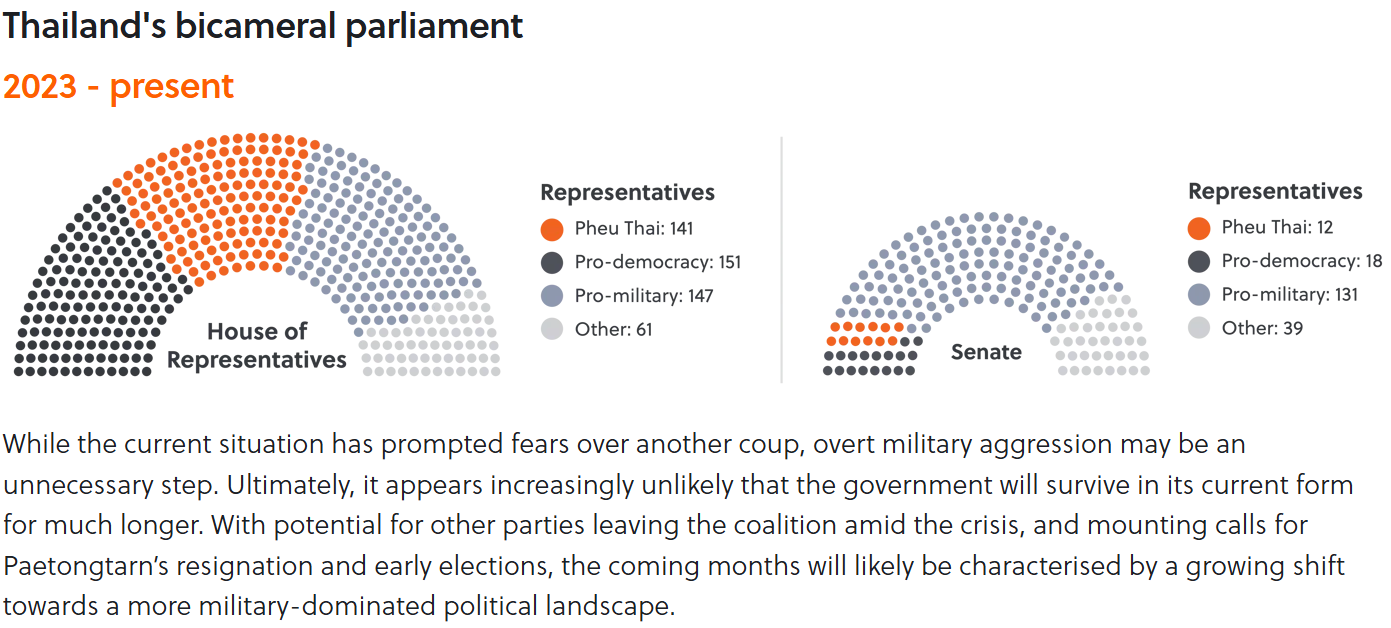Crisis of control: How Thailand’s military could destabilise the ruling coalition
On 28 May, Thai and Cambodian border forces exchanged fire after a Cambodian border patrol crossed into Thailand’s Ubon Ratchathani Province. In a subsequent leaked phone call that took place on 15 June between Thai Prime Minister Paetongtarn Shinawatra and Cambodian Senate president Hun Sen, her perceived deference to Sen has stoked strong nationalist sentiment domestically, and exacerbated fractures in the ruling coalition led by Paetongtarn’s populist Pheu Thai party. Following the exit of a major coalition partner, the Bhumjaithai party, Pheu Thai now finds itself struggling to maintain a slimming parliamentary majority as it navigates a delicate political environment.
With a strong precedent for coups during periods of political turmoil, the situation has triggered further concerns over the potential for the military to intervene – but the powerful military establishment may not need to take this step when other options, coupled with a ‘wait-and-see’ approach, are already on the table.
A decades-long tug of war
The military and its allies (including conservative-leaning and pro-military parties) have long had a contentious relationship with Thailand’s progressive and pro-democracy parties. These factions frequently lock horns; a push for progressive reforms continues to be met with resistance from the military and the monarchy, who traditionally share a strong symbiotic relationship, driving regular political deadlocks. The rivalry has been particularly pronounced with the prominent Shinawatra family at the helm of Pheu Thai, who have fielded three Prime Ministers since 2001, two of whom were removed by military coups.
Meanwhile, Pheu Thai and its coalition partners have also struggled to remain unified amid diverging agendas. In 2023, in a controversial move, Pheu Thai included pro-military parties in an 11-party coalition after the largely military-controlled Senate blocked the electoral front-runner, Move Forward Party (MFP), from forming a government (later banning the party altogether in 2024). However, the recent diplomatic scandal has strained the unhappy union, with the pro-military Bhumjaithai party’s withdrawal leaving the coalition with only a slim majority in the House of Representatives.

A coup on the horizon?
Thailand is no stranger to periodic political instability, and the dynamics currently at play – a Shinawatra-led government, a border dispute with Cambodia, and a rise in nationalist sentiment – have previously led to political change. The disputed border area has long been a sensitive issue for Thailand, with incursions thereupon frequently triggering patriotic outrage and strengthening public support for the military, which has presented itself as Thailand’s guarantor of national security and political stability.
A coup is one avenue through which Thailand’s military can take power, although there seems to be a somewhat lower appetite for this, at least as a first port of call. Deputy Prime Minister and Defence Minister Phumtham Wechayachai has even dismissed speculation around a coup in response to protests by a hardline civil society group calling for military intervention. While precedent suggests the threat of a coup cannot be discounted, it is likely that such a move will require a serious deterioration of Thailand’s internal security situation and political landscape in Bangkok. But, for now, the military could also exert pressure through other channels:
- Institutional influence. The pro-military establishment enjoys significant influence in the executive and judicial branches, including the Constitutional Court and other unelected institutions, like the Election Commission and the National Anti-Corruption Commission (NACC). The Constitutional Court has already suspended Paetongtarn while it considers a petition filed by 36 senators calling for her dismissal over alleged misconduct during the phone call, and the NACC is investigating whether she violated ethical standards.
- Popular support and the Cambodia crisis. Military leaders have framed the phone call as a moment of political naivete on Paetongtarn’s part – a sentiment that has resonated with the public. Pro-military sentiment has spiked on social media, while pro-nationalist groups and other anti-government activists have held and planned upcoming rallies in Bangkok, calling for her resignation. It is possible that the military and its backers could attempt to shore up public sentiment against Pheu Thai, while asserting the need for stronger military involvement in the government to help prevent further political instability amid the current border conflict with Cambodia.
- Coalition divisions. Fault lines in the coalition government may also present the potential for a loss of support for Pheu Thai, particularly if the military convinces more allied factions to leave the coalition, or if Paetongtarn is removed and coalition partners are unable to settle on a candidate to put forward. While the Senate can no longer vote on who becomes Prime Minister, the military may still seek to exert influence through institutional channels to undermine the coalition, and promote a candidate favourable to them.

While the current situation has prompted fears over another coup, overt military aggression may be an unnecessary step. Ultimately, it appears increasingly unlikely that the government will survive in its current form for much longer. With potential for other parties leaving the coalition amid the crisis, and mounting calls for Paetongtarn’s resignation and early elections, the coming months will likely be characterised by a growing shift towards a more military-dominated political landscape.
